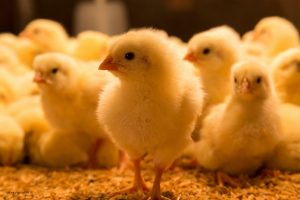At this time of year, people all over the country are tending flocks of newly acquired chicks and ducklings, or preparing to do so. When handling live poultry it’s important to take certain precautions to prevent illness. Last year at this time, live poultry was the source of three, large, multi-state Salmonella outbreaks that together sickened 334 people, the highest number of Salmonella infections ever linked to live poultry in a single year.
 Children are disproportionately affected in these outbreaks for a number of reasons. Their immunes systems are not fully developed so they are at increased risk of illness, they are less likely than adults to wash their hands properly and more likely than adults to put their fingers in their mouths and to snuggle or kiss the small birds.
Children are disproportionately affected in these outbreaks for a number of reasons. Their immunes systems are not fully developed so they are at increased risk of illness, they are less likely than adults to wash their hands properly and more likely than adults to put their fingers in their mouths and to snuggle or kiss the small birds.
That’s why health officials are cautioning those who are tending young poultry flocks to keep kids and families safe while doing so. Children under 5 should not be allowed to handle young birds. And parents should supervise older children handling the birds and washing their hands afterward.
“As adorable as baby chicks and ducklings are, it is not good for young children to handle them because of the health risk,” said Alicia Cronquist, department epidemiologist, with the Colorado Department of Health and Environment in a recent advisory. Other safety tips to follow are: washing hands thoroughly with soap and water right after touching live poultry or anything in the area where they are kept; keeps all live poultry and the equipment used to care for and feed them outside of the house; cleaning any equipment or materials associated with tending live poultry outside the house and having a dedicated set of cleaning materials for poultry care.
Salmonella infections cause diarrhea, fever and abdominal cramps. Symptoms usually begin about one to three days after exposure and last up to a week. For some people, the symptoms may be so severe that hospitalization is needed. And the complications of salmonellosis, including Reiter’s Syndrome, can be severe.




